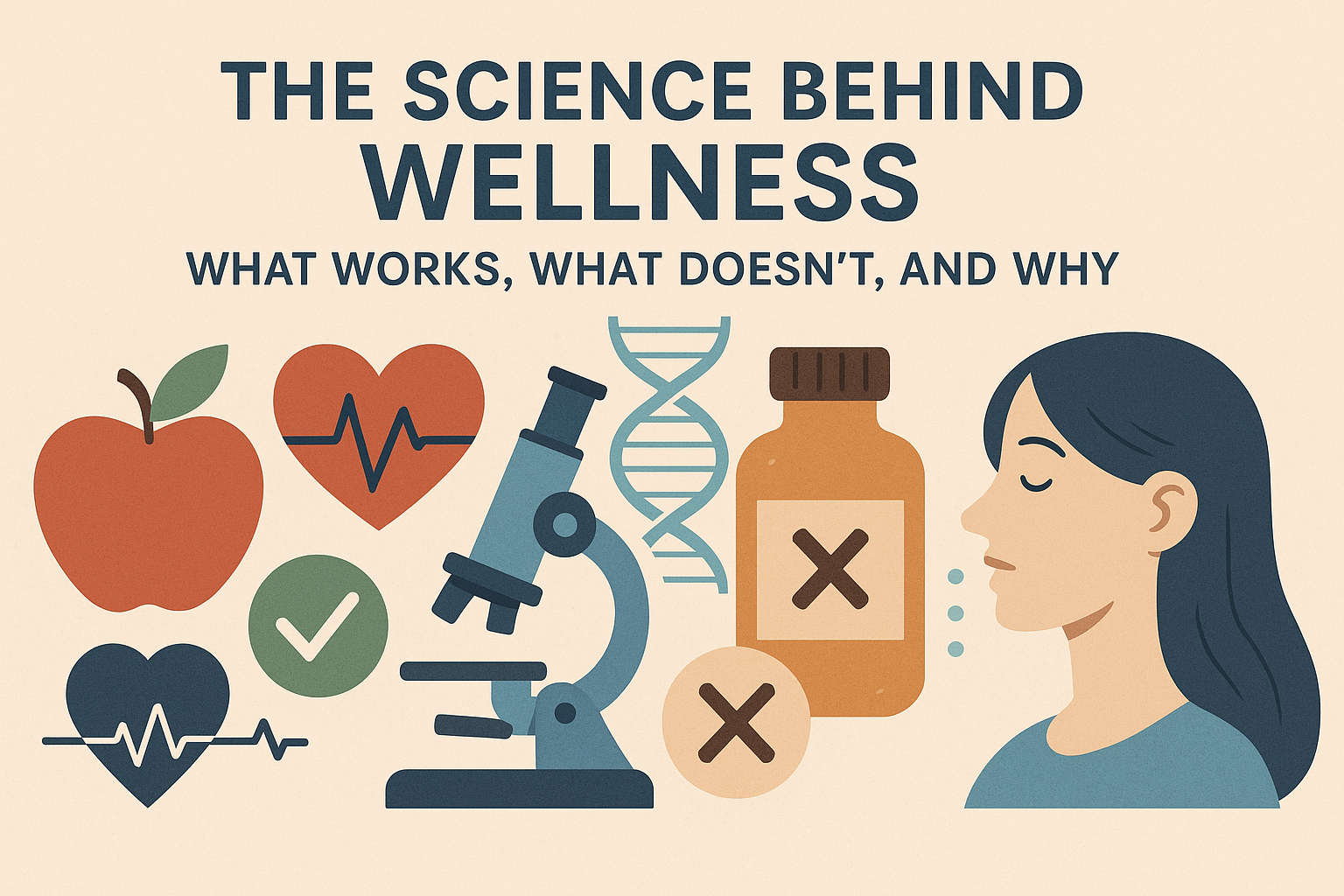Not all wellness trends are created equal. Explore the science-backed strategies that actually work—plus the myths you can ignore. Build smarter self-care starting today.
From cold plunges to collagen powders, wellness advice is everywhere. But how much of it is really supported by science—and how much is just hype?
If you’re tired of guessing what’s actually good for your health, this guide is for you. We’re diving into evidence-based wellness strategies that truly work, exposing common myths, and sharing how you can build smarter, more effective self-care habits.
🔬 What Is Wellness, Really?
Wellness goes far beyond diet and exercise. According to the Global Wellness Institute, it’s the active pursuit of activities, choices, and lifestyles that lead to a state of holistic health. This includes:
- Physical health
- Mental clarity
- Emotional resilience
- Social connection
- Spiritual alignment
- Environmental harmony
✅ What Works: Science-Backed Wellness Habits
Here are evidence-supported wellness practices that have proven benefits.
💤 1. Prioritizing Sleep
The research says:
- Chronic sleep deprivation increases risk of obesity, diabetes, heart disease, and depression.
- Sleep boosts memory consolidation, immune function, and cellular repair.
What works:
- 7–9 hours of quality sleep
- Consistent sleep and wake times
- A wind-down routine (dim lights, no screens 1 hour before bed)
🧘♀️ 2. Mindfulness & Meditation
The science:
- Studies from Harvard and UCLA show that regular meditation can reduce stress, anxiety, and inflammation, and even increase gray matter in the brain.
What works:
- 10–20 minutes of mindfulness per day
- Breathwork (like box breathing or 4-7-8 technique)
- Grounding techniques like body scans or mindful walking
🥗 3. Anti-Inflammatory Nutrition
Evidence shows:
- Diets rich in vegetables, omega-3s, fiber, and antioxidants reduce inflammation, which plays a role in chronic diseases and even mood disorders.
What works:
- Mediterranean-style diets
- Limiting ultra-processed foods
- Eating whole, colorful, plant-forward meals
- Gut-friendly choices like fermented foods and prebiotics
🚶 4. Daily Movement (Even if It’s Light)
Fact:
- Just 30 minutes of moderate exercise a day can reduce risk of all-cause mortality, according to WHO and CDC studies.
What works:
- Walking, yoga, dancing, or biking
- Stretching or mobility flows
- Short bursts of strength training or HIIT, depending on fitness level
Even 10-minute movement breaks improve circulation, metabolism, and mood.
❌ What Doesn’t Work (or Needs More Proof)
Despite their popularity, these trends aren’t always backed by strong evidence.
🚫 Detox Teas & Juice Cleanses
- Reality: The liver and kidneys naturally detox the body.
- Risk: Overuse can cause dehydration, nutrient loss, and even blood sugar crashes.
- Better option: Support natural detox with fiber, water, sleep, and balanced meals.
🧊 Ice Baths for Everyone
- Some benefits for athletes (reduced soreness), but may blunt muscle growth if overused.
- Not ideal if you have circulation issues, anxiety, or thyroid imbalances.
- Better alternative: Contrast showers or a brisk walk in cool air.
🍋 Alkaline Water & pH Diets
- Your body naturally regulates pH through respiration and kidney function.
- The science on “alkalizing foods” is limited and mostly observational.
Focus instead on whole, nutrient-dense foods and hydration—regardless of pH claims.
📱 The Role of Tech in Wellness
Apps and wearables can enhance your wellness if used mindfully.
Benefits include:
- Tracking sleep, movement, mood, and energy
- Building awareness through journaling or check-ins
- Supporting habits with reminders and visual progress
🧠 Final Thoughts: Smarter Self-Care Starts With Science
Wellness is powerful—but only when it’s based on what truly works for the body and brain. Avoid falling for fads, and instead build a wellness routine rooted in evidence, simplicity, and consistency.
Remember: The goal isn’t perfection—it’s progress that lasts.
✅ Quick Recap:
| What Works | What Doesn’t (or Needs More Study) |
|---|---|
| ✅ Sleep optimization | ❌ Detox teas and juice cleanses |
| ✅ Daily movement | ❌ Ice baths for non-athletes |
| ✅ Mindfulness and breathwork | ❌ Alkaline diets and pH hacks |
| ✅ Whole-food nutrition | ❌ Overuse of supplements without labs |
